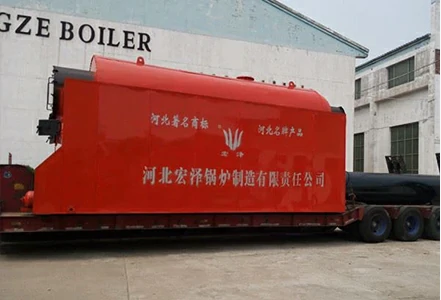
Oct . 02, 2024 05:03 Back to list
Gas-Fired Hot Water Boiler for Efficient Heating Solutions
Gas Fired Hot Water Boiler An Overview
Gas fired hot water boilers are essential components in modern heating systems, offering efficient and reliable solutions for both residential and commercial applications. These boilers work by burning natural gas or propane to generate heat, which is then transferred to water. This heated water is circulated throughout the property to provide warmth and hot water for various uses.
How It Works
The primary function of a gas fired hot water boiler is to convert gas fuel into thermal energy. The process begins in the combustion chamber where gas is ignited. The heat produced during this combustion raises the temperature of the water in the boiler tank. Most systems are equipped with a heat exchanger, which efficiently transfers the heat generated from the burning gas to the water without any direct contact.
Additionally, many modern gas fired hot water boilers are designed with energy efficiency in mind. They often feature advanced controls and sensors that optimize the burning process, minimizing excess fuel usage and reducing greenhouse gas emissions. This not only lowers utility bills but also contributes to a more sustainable environment.
Benefits of Gas Fired Hot Water Boilers
One significant advantage of gas fired hot water boilers is their efficiency. These systems typically have higher efficiency ratings compared to traditional electric water heaters. For instance, many gas boilers can achieve Annual Fuel Utilization Efficiency (AFUE) ratings of over 90%, meaning that a large percentage of the energy from the gas is converted to usable heat.
gas fired hot water boiler

Another benefit is the quick heating capability. Gas fired systems can heat water much faster than electric models, making them ideal for high-demand situations or larger households where simultaneous hot water usage is common. Furthermore, the continuous supply of hot water is a critical feature for homes with multiple bathrooms or appliances that require hot water.
Installation and Maintenance
Installing a gas fired hot water boiler involves careful planning and adherence to local building codes. It is crucial to have a qualified technician handle the installation to ensure that the system operates safely and efficiently. Proper ventilation is also necessary to expel combustion gases, which is a critical safety concern.
Regular maintenance is vital for maximizing the longevity and efficiency of the boiler. This includes periodic inspections, cleaning the burners, and checking the heat exchanger for any signs of wear or buildup. A well-maintained gas fired hot water boiler not only performs better but also helps in preventing potential failures that could lead to costly repairs.
Conclusion
Gas fired hot water boilers represent a wise choice for heating and hot water needs. Their efficiency, quick heating capabilities, and reliability make them a popular option for both homeowners and businesses. As technology continues to evolve, these systems are becoming even more efficient and environmentally friendly, making them a key player in the shift towards sustainable energy solutions. Whether you're upgrading an existing system or investing in a new installation, the benefits of a gas fired hot water boiler are undeniable, providing comfort and convenience for years to come.
-
High-Efficiency Commercial Oil Fired Steam Boiler for Industry
NewsJul.30,2025
-
High-Efficiency Biomass Fired Thermal Oil Boiler Solutions
NewsJul.30,2025
-
High Efficiency Gas Fired Thermal Oil Boiler for Industrial Heating
NewsJul.29,2025
-
High-Efficiency Gas Fired Hot Water Boiler for Sale – Reliable & Affordable
NewsJul.29,2025
-
High Efficiency Biomass Fired Hot Water Boiler for Industrial and Commercial Use
NewsJul.29,2025
-
High-Efficiency Biomass Fired Hot Water Boiler for Industrial Use
NewsJul.28,2025
Related PRODUCTS






















